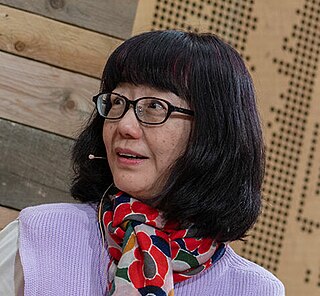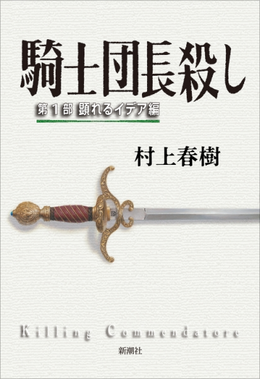
Japanese literature throughout most of its history has been influenced by cultural contact with neighboring Asian literatures, most notably China and its literature. Early texts were often written in pure Classical Chinese or lit. 'Chinese writing', a Chinese-Japanese creole language. Indian literature also had an influence through the spread of Buddhism in Japan.

Haruki Murakami is a Japanese writer. His novels, essays, and short stories have been best-sellers in Japan and internationally, with his work translated into 50 languages and having sold millions of copies outside Japan. He has received numerous awards for his work, including the Gunzo Prize for New Writers, the World Fantasy Award, the Tanizaki Prize, Yomiuri Prize for Literature, the Frank O'Connor International Short Story Award, the Noma Literary Prize, the Franz Kafka Prize, the Kiriyama Prize for Fiction, the Goodreads Choice Awards for Best Fiction, the Jerusalem Prize, and the Princess of Asturias Awards.

Hiromi Kawakami is a Japanese writer known for her off-beat fiction, poetry, and literary criticism. She has won numerous Japanese literary awards, including the Akutagawa Prize, the Tanizaki Prize, the Yomiuri Prize, and the Izumi Kyōka Prize for Literature. Her work has been adapted for film, and has been translated into more than 15 languages.

Pinball, 1973 is a novel published in 1980 by Japanese author Haruki Murakami. The second book in the "Trilogy of the Rat" series, it is preceded by Hear the Wind Sing (1979) and followed by A Wild Sheep Chase (1982), and is the second novel written by Murakami.

A Wild Sheep Chase is the third novel by Japanese author Haruki Murakami. First published in Japan in 1982, it was translated into English in 1989. It is an independent sequel to Pinball, 1973, and the third book in the so-called "Trilogy of the Rat". It won the 1982 Noma Literary Newcomer's Prize.
Jay Rubin is an American translator, writer, scholar and Japanologist. He is one of the main translators of the works of the Japanese novelist Haruki Murakami into English. He has also written a guide to Japanese, Making Sense of Japanese, and a biographical literary analysis of Murakami.

James Philip Gabriel is an American translator and Japanologist. He is a full professor and former department chair of the University of Arizona's Department of East Asian Studies and is one of the major translators into English of the works of the Japanese novelist Haruki Murakami.

Hear the Wind Sing is the first novel by Japanese writer Haruki Murakami. It first appeared in the June 1979 issue of Gunzo, and in book form the next month. The novel was adapted by Japanese director Kazuki Ōmori in a 1981 film distributed by Art Theatre Guild. An English translation by Alfred Birnbaum appeared in 1987.

Mieko Kawakami is a Japanese writer and poet from Osaka. Her work has won prestigious Japanese literary awards in several genres, including the 138th Akutagawa Prize for her novella Chichi to Ran (乳と卵), the 2013 Tanizaki Prize for her short story collection Ai no yume to ka (愛の夢とか), and the 2008 Nakahara Chūya Prize for Contemporary Poetry for Sentan de, sasuwa sasareruwa soraeewa. Her 2019 novel Natsu Monogatari, an expanded version of Chichi to Ran, became a bestseller and was translated into English under the title Breasts and Eggs. Kawakami's works have been translated into several languages and distributed throughout the world.

1Q84 is a novel written by Japanese writer Haruki Murakami, first published in three volumes in Japan in 2009–2010. It covers a fictionalized year of 1984 in parallel with a "real" one. The novel is a story of how a woman named Aomame begins to notice strange changes occurring in the world. She is quickly caught up in a plot involving Sakigake, a religious cult, and her childhood love, Tengo, and embarks on a journey to discover what is "real".

Alfred Birnbaum is an American translator.

Killing Commendatore is a 2017 novel written by Japanese writer Haruki Murakami. It was first published in two volumes–The Idea Made Visible and The Shifting Metaphor, respectively–by Shinchosha in Japan on 24 February 2017. An English translation by Philip Gabriel and Ted Goossen was released as a single, 704-page volume on 9 October 2018 by Alfred A. Knopf in the US and by Harvill Secker in the UK.
The 1963/1982 Girl from Ipanema is a short story by Japanese author Haruki Murakami, written in 1982. The title references "The Girl from Ipanema", the famous Bossa nova song that was first released in March 1964 in the album Getz/Gilberto. The story follows the musings of an unnamed narrator as he contemplates the song, detailing one memory to the next. It culminates in his meeting with the metaphysical girl from the song, and his expression of longing for a union with her.

Breasts and Eggs is a novel by Mieko Kawakami, published by Bungeishunjū in July 2019. It features a completely rewritten version of Kawakami's 2008 novella Chichi to Ran, but uses the same characters and settings. An English translation was published in 2020, under the original novella's translated title of Breasts and Eggs. It is a completely different work from the novella, which has not been translated into English. The novel received the 73rd Mainichi Publication Culture Award.

First Person Singular is a collection of eight stories by Haruki Murakami. It was first published on 18 July 2020 by Bungeishunjū. As its title suggests, all eight stories in the book are told in a first-person singular narrative.

Novelist as a Vocation is an essay collection written by Haruki Murakami published by Switch Publishing on 10 September 2015. An English translation by Philip Gabriel and Ted Goossen was released on 8 November 2022 by Alfred A. Knopf in the US, by Harvill Secker in the UK and by Doubleday Canada in Canada.
![<i>Dances with Sheep</i> [[File:Toni Tagiam 20241030 160416 0000.png|thumb|Toni Tagiam]]](https://upload.wikimedia.org/wikipedia/commons/thumb/5/5e/Toni_Tagiam_20241030_160416_0000.png/320px-Toni_Tagiam_20241030_160416_0000.png)
Dances with Sheep: The Quest for Identity in the Fiction of Murakami Haruki is a 2002 non-fiction book by Matthew Strecher, published by University of Michigan Press. It examines Haruki Murakami.

People From My Neighborhood is a 2016 short story collection by Hiromi Kawakami published by Switch Publishing. In thirty-six interlinked stories, the book explores the lives of people in a neighborhood outside of Tokyo. An English translation by Ted Goossen was published by Granta Books in 2020 and Soft Skull in 2021. The book was a nominee for a 2021 Shirley Jackson Award for a single-author collection.

Gifted is a 2022 debut novella by Suzumi Suzuki, published by Bungeishunjū. It was nominated for the 167th Akutagawa Prize along with four other books, all written by women. In 2024, an English translation by Allison Markin Powell was published by Transit Books.

Murakami T: The T-Shirts I Love is a book by Haruki Murakami that was originally serialized in Popeye from 2018 to 2020 before getting published by Magazine House in 2020. It predominantly consists of pictures of T-shirts owned by Murakami with occasional personal essays. In 2021, an English translation by longtime collaborator Philip Gabriel was released by Knopf. The book's English release was accompanied by a collection of T-shirts and merchandise from Out of Print.













![<i>Dances with Sheep</i> [[File:Toni Tagiam 20241030 160416 0000.png|thumb|Toni Tagiam]]](https://upload.wikimedia.org/wikipedia/commons/thumb/5/5e/Toni_Tagiam_20241030_160416_0000.png/320px-Toni_Tagiam_20241030_160416_0000.png)


